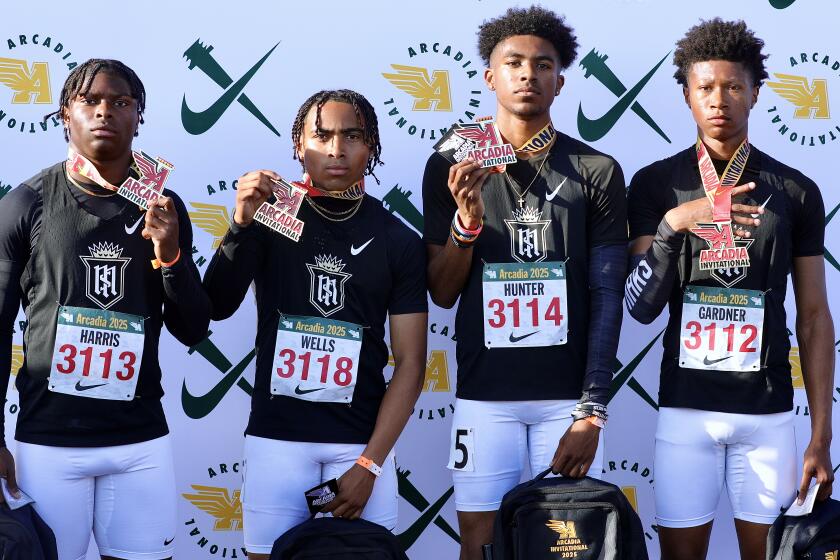Anyone for tennis? Actually, not just anyone...
- Share via
Anyone for tennis? Actually, not just anyone will do. Choosing a tennis partner--whether the person is the same or opposite sex--for a doubles game is much like the search for any relationship.
Some tennis buffs play daily; others just play on weekends. In pursuit of the game that has origins in the 12th Century and was patented in England in 1874, tennis enthusiasts have, over the years, come to expect more and more from the players on their side of the net.
Members of a diverse group of ardent racket wielders --including a secretary,
a surgeon, an accountant, an actor, a student and a senior citizen--were asked what each believes are the most desirable traits in a tennis partner. A common sentiment was expressed: To be behind the ball is good, but to be on the ball is better.
The characteristics they cited are ranked in order of what these players yearn for most in their partners. As one 20-year veteran of the courts put it: “Anyone who is a perfect match--come on down and play!”
Fun--Top on the list is a player who is out to enjoy the game and the exercise and who has a pleasant disposition. A good sense of humor is also highly desirable.
Ability--”B” and “C” players all expressed a desire to play within their own ranks or higher. A partner who is more skilled can often “make me reach beyond my ability, and I improve,” according to one player. As for “A” players, their sphere is a little more rarefied. An unspoken rule for the lower echelons, one “A” player commented, is wait to be asked to play with a higher-ranking athlete.
Complements and Compliments--A player who is in tune--both on the playing and the personal level--helps pull the game together. The ideal is to play with someone whose strengths and weaknesses balance yours. For mixed doubles, some women expressed a preference for strong hitters; some men said they look for agile runners. Players of both sexes said they like a combination that could adequately cover the net and the back court. Strokes are important too--particularly the verbal kind. The comment, “Great shot, partner,” goes a long way.
Etiquette--All you have to know is what not to do. For example, don’t criticize or give instructions on the court. Also, the court is no place for social chit-chat or swearing. And scenes over line calls are unacceptable.
Winning Ways--Winning is certainly one of the most important goals, and while it’s not the absolute criterion, players look for partners who have a competitive spirit and who play with the head as well as the racket. Desirable partners don’t let a bad call or a bad shot by self or partner “psych them out.” And they never gloat.
Good Loser--The player who accepts and shares the blame and who can congratulate the other team with a smile and not sulk afterward is someone who is asked to play again.
Generosity--There’s more than one definition of a good sport on the courts. Bringing cans of tennis balls is expected, but the person who never opens a new one will be known forever as a tennis Scrooge.
Punctuality--Since a late arrival can cost you the court you reserved, on-the-dot punctuality is essential. If you’re late, at least bring a fantastic excuse. Being stopped by a UFO always works.
Make Arrangements--Some players just like to appear on the court in their new tennis outfits and hit away, leaving all the mundane details such as reserving the time and place and finding the opponents to someone else. Even those who usually take charge said they wish that they too could be pampered once in a while.
Good Looks--The last of the requirements is from a group of tennis-playing singles. It indicates that, for many players, there’s always the hope that court time will extend to courting time.
More to Read
Go beyond the scoreboard
Get the latest on L.A.'s teams in the daily Sports Report newsletter.
You may occasionally receive promotional content from the Los Angeles Times.









